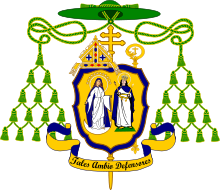Roman Catholic Bishop of Quebec
|
Archdiocese of Québec Archidioecesis Quebecensis Archidiocèse de Québec |
|
|---|---|

Coat of Arms of the Archdiocese of Québec
|
|
| Location | |
| Country | Canada |
| Territory | Quebec City |
| Ecclesiastical province | Quebec |
| Metropolitan | Quebec City, Quebec |
| Statistics | |
| Area | 35,180 km2 (13,580 sq mi) |
| Population - Total - Catholics |
(as of 2014) 1,226,493 1,062,746 (86.6%) |
| Parishes | 207 |
| Information | |
| Denomination | Roman Catholic |
| Rite | Roman Rite |
| Established | 12 January 1658; 359 years ago |
| Cathedral | Notre-Dame de Québec Cathedral |
| Patron saint | St. Ann |
| Secular priests | 737 |
| Current leadership | |
| Pope | Francis |
| Archbishop | Gérald Lacroix |
| Auxiliary Bishops | Louis Corriveau, Marc Pelchat |
| Emeritus Bishops | Maurice Couture |
| Website | |
| www |
|
The Archdiocese of Québec (Latin: Archidioecesis Quebecensis; French: Archidiocèse de Québec) is a Catholic archdiocese in Quebec, Canada. Being the first see in the New World north of Mexico, the Archdiocese of Québec is also the primatial see for Canada. The Archdiocese of Québec is also the ecclesiastical provincial for the dioceses of Chicoutimi, Sainte-Anne-de-la-Pocatière and Trois-Rivières. The archdiocese's cathedral is Notre-Dame de Québec Cathedral in Quebec City.
From the beginning of colonisation of the New World, the Church influenced the politics and policies of New France. Even during the first voyages of Jacques Cartier in the 16th Century, missionary priests would accompany the explorers on their voyages to the New World. After two failed attempts to settle in Acadia, in 1608, Québec City was founded by Samuel de Champlain, giving the Church a solid base in which to spread the faith to the Indigenous populations. In 1615, the Recollet missionaries arrived in Québec, followed by the Jesuit missionaries 10 years later. Their presence would help drive the colonies, giving the colonizers a moral reason for their presence, as well as giving the Church an influential position in domestic and local policy. In 1658, the Church would establish an Apostolic Vicariate by Pope Alexander VII, 124 years since the first voyage of Jacques Cartier in 1534. The vicar apostolic was François de Laval. As The vicar apostolic of Québec, Laval was a central member of the Sovereign Council of New France. Arguably, while he was charged with only the spiritual matters of New France, he had the most influence as he was the highest representative of the Church, as well as having excellent relations with King Louis XIV. In 1663, Laval would establish the Seminary of Québec. In 1674, with the population of New France growing rapidly and the Seminary of Québec enrolling more students, Pope Clement X elevated the Apostolic Vicariate to a diocese, which would depend directly on the Holy See; this provision would later secure its permanence after New France passed into the hands of Great Britain in 1760. At its peak, in 1712, the Diocese of Québec covered the entire American continent to the Gulf of Mexico. Only the British colonies that would later become the United States and the Spanish colony of Florida were not under the authority of the Bishop of Quebec.
...
Wikipedia
